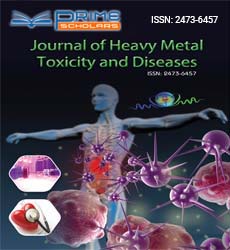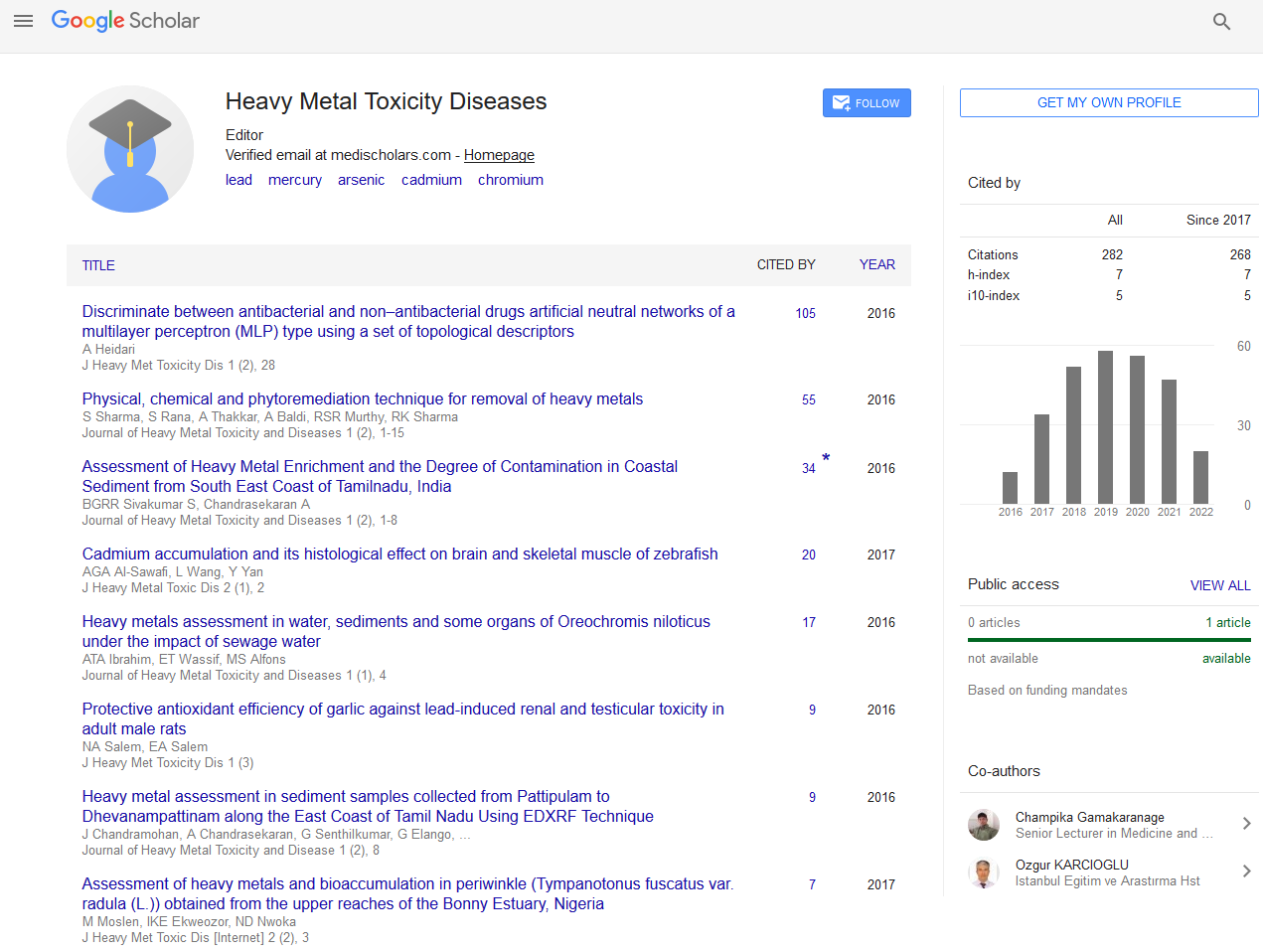Perspective - (2023) Volume 8, Issue 5
Exploring Alternative Treatments for Heavy Metal Intoxication: A Holistic Approach
Zhing Shi*
Department of Toxicology, Tianjin University, China
*Correspondence:
Zhing Shi,
Department of Toxicology, Tianjin University,
China,
Email:
Received: 30-Aug-2023, Manuscript No. ipjhmct-23-18537;
Editor assigned: 01-Sep-2023, Pre QC No. ipjhmct-23-18537 (PQ);
Reviewed: 15-Sep-2023, QC No. ipjhmct-23-18537;
Revised: 20-Sep-2023, Manuscript No. ipjhmct-23-18537 (R);
Published:
27-Sep-2023, DOI: 10.21767/2473-6457.23.5.42
Introduction
Heavy metal intoxication poses a significant threat to human
health, with exposure stemming from various sources such as
contaminated water, air, and food. Conventional medical treatments
for metal intoxication often involve chelation therapy,
which uses chemical agents to bind and eliminate metals from
the body. However, the side effects and limitations of these treatments
have led researchers and individuals to explore alternative
approaches. This article delves into some promising alternative
treatments for heavy metal intoxication, emphasizing holistic
and natural methods.
Description
Chelation therapy, though widely used, is not without drawbacks.
The synthetic chelating agents commonly employed can lead to
side effects like kidney damage and depletion of essential minerals.
As a result, individuals are increasingly turning to natural
chelators, such as cilantro and chlorella. These plants are known
for their ability to bind with heavy metals and facilitate their excretion
from the body, offering a gentler alternative to conventional
chelation. The role of diet in heavy metal detoxification
cannot be overstated. Certain foods and nutrients have demonstrated
the ability to support the body in eliminating heavy metals.
Garlic, for example, contains sulfur compounds that enhance
the production of glutathione, a powerful antioxidant crucial
for detoxification. Additionally, foods rich in fiber, such as fruits,
vegetables, and whole grains, aid in the removal of heavy metals
from the digestive tract. Supplementing with essential minerals
can act as a preventive and therapeutic measure against heavy
metal toxicity. Calcium, zinc, and magnesium, for instance, can
compete with toxic metals for absorption in the body. By ensuring
optimal levels of these minerals, individuals may reduce the
absorption of harmful metals and support their body’s natural
detoxification processes. Sweating is a natural way for the body
to eliminate toxins, including heavy metals. Sauna therapy has
gained popularity as a non-invasive and enjoyable method for
promoting detoxification. Sweating induced by sauna use helps
excrete heavy metals through the skin, providing an alternative
route for elimination. Regular sauna sessions, when combined
with proper hydration, can enhance the body’s ability to rid itself
of accumulated toxins. Herbal medicine has a rich history of aiding
in detoxification. Several herbs, such as milk thistle, turmeric,
and dandelion, exhibit hepatoprotective properties and support
liver function, a crucial organ for detoxifying the body. Incorporating
these herbs into one’s diet or as supplements may assist in
mitigating the impact of heavy metal exposure. The mind-body
connection plays a vital role in overall health, including detoxification.
Stress reduction techniques, such as meditation and
yoga, have been associated with improved immune function and
increased resilience to environmental toxins. By promoting relaxation
and reducing stress, these practices indirectly contribute to
the body’s ability to detoxify and heal.
Conclusion
While conventional medical treatments for heavy metal intoxication
remain a staple in clinical practice, exploring alternative
and complementary approaches can offer individuals a more
comprehensive and holistic strategy for detoxification. From dietary
modifications to herbal remedies and mind-body practices,
the array of alternative treatments provides a diverse toolkit for
those seeking effective and natural ways to address heavy metal
exposure. It is crucial to consult with healthcare professionals
before embarking on any alternative treatments to ensure they
align with individual health needs and conditions.
Citation: Shi Z (2023) Exploring Alternative Treatments for Heavy Metal Intoxication: A Holistic Approach. J Heavy Met Toxicity
Dis. 08:42.
Copyright: © 2023 Shi Z. This is an open-access article distributed under the terms of the Creative Commons Attribution License,
which permits unrestricted use, distribution, and reproduction in any medium, provided the original author and source are
credited.

